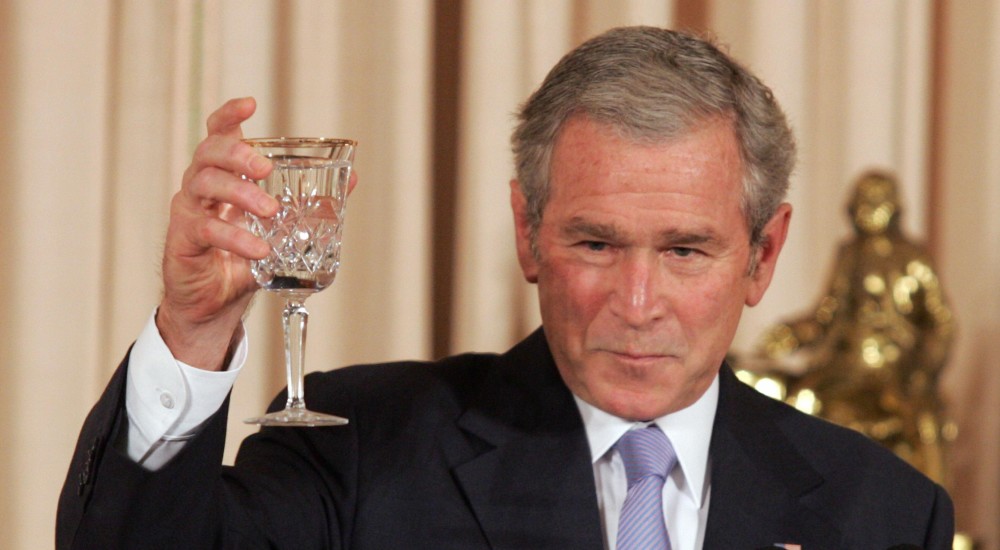Rethinking W
Isn’t revisionist history great? It allows us to constantly re-jigger the balance sheet on historical figures, events and patterns with the benefit of 20-20 hindsight. It reveals seismic shifts in the way people think. It turns everyone into a Monday morning quarterback…long after the season is over.
Revisionist history most often takes hold many years, even decades after the fact. It does not usually take shape shortly after a person has left the stage. And so it was surprising, perhaps even shocking, to see the results of a recent poll on George W. Bush.
Here is a president who left office six and a half years ago with favorability numbers in the low 30’s. But now, incredibly it seems, he is at 52 percent. He is more popular than Barack Obama.
How to account for a jump of 20 points in six and a half years?
Bill Kristol, admittedly a warhawk and neo-conservative thought leader, makes some claims that are worthy of evaluation:
What the people are saying is that George W. Bush was—basically—right.
Bush was right to take the jihadist threat seriously after 9/11 (though he may have fallen prey to euphemism at times in describing it)
Bush was also right to see that the combination of terrorism, Islamic jihadism, and weapons of mass destruction is particularly dangerous.
Bush was right that there is no substitute for American leadership in a dangerous world, and that “leading from behind” is no substitute for .??.??. leading.
Bush’s mistake was not his ambitious foreign policy agenda. It was the failure to educate the country as to its merits and necessity and then the decision to retreat from it more than perhaps he had to.
Of course, this analysis does not take into account Bush’s domestic record, but it is difficult to believe people would see him in a more favorable light because they have now decided to give him a pass on the financial meltdown or the massive increase in the deficit and national debt on his watch. No, it seems safe to assume his quasi-resurrection is the result of national security and foreign policy.
So, are Americans essentially seeing Bush in a much more favorable light because they have now witnessed a far different national security and foreign policy from president Obama….and they prefer Bush’s more muscular and aggressive approach to the war on terrorism (a phrase we haven’t heard much since Bush left the White House)? With the perceived threat of ISIS growing by the day, are people again appreciating a president who rose to great heights of popularity in the aftermath of 9/11? One could hardly be faulted for making that argument.
But there are likely other elements in play. Perhaps, as was the case right after 9/11, people wanted to like Bush for the most part, and his 32% favorability when he left office represented a reluctant disapproval – with the obvious exception of those on the left who hated Bush from the moment he took office because they believed he stole the election of 2000 and then came under the spell of the even-more-evil Dick Cheney.
As 9/11 started to disappear into the rear view mirror, Bush’s popularity collapsed over a period of years when he paid a steep political price for the seemingly false premise of WMD’s to justify the war in Iraq, the thousands of casualties, the flawed military strategy, and the heavy-handed laws that boosted security at the expense of liberty. And then there was the lovely parting gift – the financial collapse at the tail end of his presidency. As per an old colloquialism borrowed from my Mom, he functioned in disaster, but did not finish in style.
At the same time, we can hardly dismiss the fact of an increasingly mercurial electorate. The people re-elected Bush in 2004 after he started the war in Iraq, then repudiated him largely because of the war in 2006, then elected Obama in 2008, then repudiated him in 2010, then re-elected him in 2012, then repudiated him again in 2014. The only pattern here is a consistently confused, restless and indecisive electorate.
Revisionist history is kind to some presidents and not to others. Some ex-presidents get more popular by the year, most famously the martyred John F. Kennedy, standing to this day at over 70% favorability. And then there is Harry S. Truman, who left office with favorability in the 20’s, and over the years was not only rehabilitated but became something of a folk hero as the humble haberdasher from the perfectly named presidential hometown of Independence, Missouri.
Some presidents get less popular after leaving office, Richard Nixon being the most obvious example. He was elected twice, the second time by a landslide, and.then run out of the White House in the Watergate scandal. His standing continues to erode over the years as the poster child for political corruption, with his current favorability at about 20%.
Some presidents have been viewed about the same in history as they were in the oval office. Reagan was very popular and remains so. Carter was very unpopular and remains so. Clinton was popular when he left office and is currently hard to judge given the entanglements with his foundation and his wife’s presidential campaign.
Perhaps George W. Bush is following in the footsteps of Harry S. Truman, leaving office unloved by the American people but now apparently rehabilitated in their minds – far more quickly than give-em-hell Harry. But the ultimate question is whether this revival is more about Bush, or the president who succeeded him.



